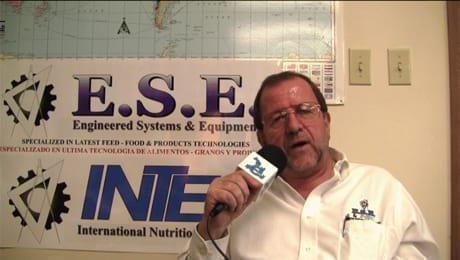Check out what is new in Animal Feed
Find the best technical articles, forums, and videos on Animal Feed at Engormix. Enter now and interact with the world's largest agricultural social network.

Vivek Kuttappan (Cargill) shared his research on the beneficial effects of postbiotics and phytogenics on mitigating APEC severity in laying hens, during this Engormix interview at IPPE 2026 in Atlanta. ...
Comments : 1
Recommendations: 0

Manuel Da Costa (Cargill) comments on advances in nutritional solutions using postbiotics and phythogenics, and how microbiome analysis helps identify opportunities or specific issues to address, during this Engormix interview at IPPE 2026 in Atlanta. ...
Comments : 0
Recommendations: 0
Recommended events
May 5, 2026
Canada - Alberta - Edmonton

Tom D'Alfonso (USSEC) comments on USSEC goals and the consistency and digestibility of U.S. soy as crucial advantages in the market, during this Engormix interview at IPPE 2026 in Atlanta. ...
Comments : 0
Recommendations: 0
AI-generated image for illustrative purposes, based on photos of the author Summary Artificial intelligence is gaining attention in animal feed manufacturing, but its adoption in plants remains gradual rather than...
Comments : 0
Recommendations: 0

Engineer Josef Barbi, President of E.S.E. & Intec, talks with engormix about financing methods for the industry through a banking institution in the United States ...
Comments : 0
Recommendations: 0

Marcio Ceccantini, Global Technical Manager for Vitamins at Adisseo, discusses the evolving role of vitamins in modern animal production and introduces the Microvit® Nutrition Guide 2026, featuring updated recommendations for 18 species and 36 production phases to support performance and nutritional precision worldwide. ...
Comments : 0
Recommendations: 1
.jpg&w=3840&q=75)

Trade, regulations and current challenges in the rendering industry
Suggested link

Engineer Josef Barbi, President of E.S.E & INTEC, presents part of an integrated pelleting and extrusion plant for aquaculture feed from ESE's factory in Caney, Kansas, with equipment ready for export. The system includes a 250 HP pellet mill for organic shrimp feed (5–8 t/h, 2 mm pellets), an 8–12 t/h extrusion line, and a total capacity of approximately 30 t/h. The plant incorporates Evolution fine grinding (200–250 microns), high energy efficiency, an...
Comments : 0
Recommendations: 0
Introduction It is estimated that the human world population will exceed nine billion by 2050 (United Nations, 2019), raising a global concern over food security. Increasing consumption of animal protein has been suggested as one of the sustainable strategies to address food security, as it is a rich source of the most common limiting essential amino acids (FAO, 2013; Gorissen and Witard, 2018; Van Vliet et al., 2015), as well as vitamin B12 (Obersby et al., 2013), calcium (Magkos et...
Comments : 0
Recommendations: 0
Introduction Advancing our knowledge of animal nutrition has been a globally significant research field for approaching a century. The vast knowledge accumulated on how to meet the nutritional requirements of livestock has allowed researchers to evolve towards use of nutrition to achieve the wider aims of global food security. In parallel to the highly focused advances in animal nutrition, other researchers were grappling with the seemingly intractable conflict between globalized...
Comments : 0
Recommendations: 0

Erik Visser, CEO at Hamlet Protein, shares his outlook on animal protein production for 2026, highlighting poultry and aquaculture as key growth drivers. He discusses regional dynamics, feed economics, sustainability, and the strategic importance of ROI and adaptability for producers. ...
Comments : 0
Recommendations: 0


Updated Vitamin Requirements Across Species: Microvit® Nutrition Guide
Suggested link
Introduction As the world population continues to grow, along with the consumption of animal-sourced foods, animal production in the world is expected to grow in the decades ahead. The OECD and FAO estimated that, due to population growth and the ongoing transition towards a higher intake of animal products, global livestock production will grow by 14% from 2020 to 2029 (OECD/FAO, 2022; Ritchie and Roser, 2019). However, the statistic differs between continents and regions of the...
Comments : 0
Recommendations: 0

Roshan Adhikari (CJ Bio America) speaks on the use of branched-chain amino acids (leucine, isoleucine, valine) and tryptophan in layer nutrition, in this Engormix interview at IPPE 2026 in Atlanta. ...
Comments : 0
Recommendations: 2
.jpg&w=3840&q=75)

Trade, regulations and current challenges in the rendering industry
Suggested link

Yuan-Tai Hung (IFEEDER) comments on the impact of limiting amino acids such as methionine and lysine in poultry and swine diets in the event of a supply chain disruption, during this Engormix interview at IPPE 2026 in Atlanta. ...
Comments : 0
Recommendations: 0

Megan Provost (AFIA) offers insights on supply and demand for vitamins and amino acids, as well as market trends in recent years, in this Engormix interview at IPPE 2026 in Atlanta. ...
Comments : 0
Recommendations: 0

Lara Moody (IFEEDER) explains the impact of vitamin supply chain disruptions on meat and egg production, as well as food security, in this Engormix interview at IPPE 2026 in Atlanta. ...
Comments : 0
Recommendations: 0

Constance Cullman (AFIA / IFIF) talks about sustainability interventions, their impact, and how they can be tracked, in this Engormix interview at IPPE 2026 in Atlanta. ...
Comments : 0
Recommendations: 1


Updated Vitamin Requirements Across Species: Microvit® Nutrition Guide
Suggested link

Reggie Strickland (Farmer/USSEC Board Director) shares his experience and comments on soy quality, in this Engormix interview at IPPE 2026 in Atlanta. ...
Comments : 0
Recommendations: 0

Jim Sutter (USSEC) explains the benefits of the soy produced in the United States, as well as their solid supply chain, in this Engormix interview at IPPE 2026 in Atlanta. ...
Comments : 0
Recommendations: 0
.jpg&w=3840&q=75)

Trade, regulations and current challenges in the rendering industry
Suggested link

Madalina Diaconu (EW Nutrition) explains their current projects, as well as their solutions aimed at helping producers with important challenges, such as Coccidiosis and Necrotic Enteritis, during this Engormix interview at IPPE 2026 in Atlanta. ...
Comments : 0
Recommendations: 0




































